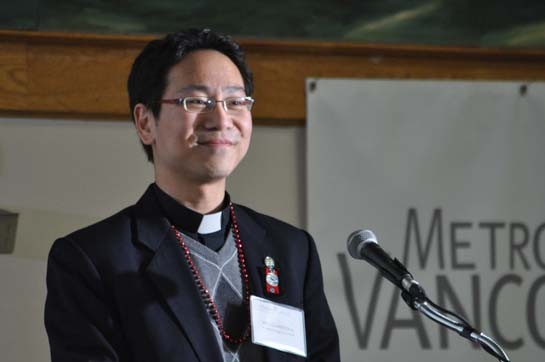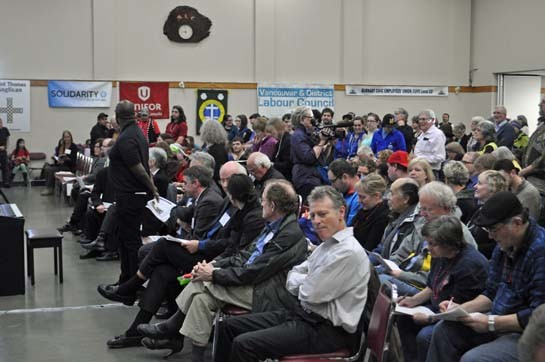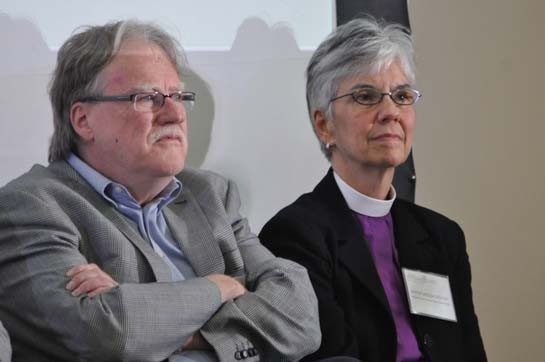A union leader, a priest and a community activist walk into a packed auditorium. No, this isn't the lead-in to a bad joke. Rather, it's how the founding assembly of
Metro Vancouver Alliance began. On March 19, 650 people gathered in the Maritime Labour Centre in Vancouver to celebrate the launch of a coalition of over 40 faith, labour and community organizations, representing 200,000 people in Greater Vancouver.
MVA was not built around an issue; instead, it was founded on relationships and trust between people who don't normally associate with each other. It's all about working together for the common good.
The alliance started several years ago when Sister Elizabeth Kelliher, a social activist Franciscan nun from Vancouver's Downtown Eastside, envisioned bringing the Industrial Areas Foundation model of broad-based organizing to Vancouver. Clarence Li, a young Anglican priest, was moved by her vision and set to work to realize it.
Founded in 1940, the Industrial Areas Foundation describes its chief purpose as power, and its chief product as social change. The IAF model, developed by Saul Alinsky, took shape during his organizing efforts with Chicago's meat packers. At the time, they had no union, no bargaining power, and needed to improve their working conditions. Imagining the potential power of an "organization of organizations," Alinsky brought together 100 neighbourhood groups, small businesses, labour unions, and the Catholic church to support the workers. They held a massive rally, hoping to avert a strike. Significantly, labour leader John Lewis shared the stage with Chicago's Bishop Bernard Sheil, in a show of labour-faith solidarity. The powerful Armour Meat Company recognized the union the very next day.
As president of the Vancouver & District Labour Council, I've been involved in dozens of issue-based coalitions, but this kind of alliance-building feels decidedly different to me. The idea of building a solid relationship between faith, labour and community makes sense. I've often seen, in Latin America, how even the staunchest feminist groups will invite a priest to their meetings, giving women in the community social permission to be involved.
As a trade unionist, I recognize that our movement needs a boost. We also need to value our member's activism in their faith and community organizations. And, when leaders from each of these sectors speak with one voice, as they do in MVA, it makes for a powerful movement.

Clarence Li, A Young Anglican Priest, Was Moved By Sister Elizabeth Kelliher’s Vision For Vancouver’s Downtown Eastside.
MVA members come from all walks of life: union locals, faith congregations, youth groups, aboriginal organizations, neighbourhood houses, co-ops, academic departments and community non-profits. On March 19, as an intentional way of demonstrating MVA's strength and diversity, organizational representatives lined up at microphones to identify their organizations and pledge their commitment. As they spoke, delegates from each organization stood so that the full cohort could be recognized. The biggest response from the crowd was given to Michael Markwick, an instructor in Capilano University's School of Communication, who said, "We're told that our job at the university is to 'graduate taxpayers,' but I think we can shoot higher than that."
"What it takes to change the world is what I see here tonight," said Jim Sinclair, president of the B.C. Federation of Labour. "We cannot change the world alone, we know this." Roman Catholic Archbishop Miller noted that March 19 was the first anniversary of the inauguration of Pope Francis, admired for his public stand on the side of the poor. Miller said that faith-based traditions "are an essential part of the wider civil community. We pledge to work together for the good of all."
Anglican Bishop Melissa Skelton, who had assumed her position just two weeks earlier, smiled at the audience of over 600 and said, "I am the new kid on the block and this is the block I want to live on." As a trainer and facilitator, she is impressed that leadership training is offered in advance of moving forward with the work of the alliance.
Community leaders who took part included Virginia Weiler, board chair of Vancity Savings Credit Union, and Paul Michael Taylor, executive director of Gordon Neighbourhood House. Both spoke of the value of community organizing and their belief that the MVA will be a vehicle for powerful and positive change.
Given the political, although non-partisan, nature of the MVA, it was important to introduce politicians to the depth and breadth of this new organization. North Vancouver City mayor Darrell Mussatto and City of Vancouver Councilor Geoff Meggs both spoke. Numerous provincial MLAs, and former premier Mike Harcourt, also participated. They all acknowledged that the MVA will be hard to ignore. Meggs said, "It is an honour to be here with such a diverse group: community, labour and faith. It is really unprecedented, in my experience." Mussatto invited the MVA to "keep our feet to the fire."

Hundreds Gathered In Vancouver On March 19, 2014, To Celebrate The Launch Of Metro Vancouver Alliance.
In his book Rules for Radicals, Alinsky wrote, "What follows is for those who want to change the world from what it is to what they believe it should be." Today, there are over 60 active IAF-modelled alliances across the U.S., Canada, the UK, Germany and Australia. By bringing diverse groups together, these coalitions have had great success. For example, Citizens UK persuaded the London Olympic Games Committee to become a living wage employer.
The IAF model has one ironclad rule of organizing: "Never do for others what they can do for themselves." It emphasizes developing new leaders from within local organizations, as opposed to bringing in leaders from outside the community.
"Community organizations like the MVA operate on the principle of 'power before program,'" said MVA lead organizer Deborah Littman. "Our aim is to build an
organization that is powerful enough to enable people to act effectively on the issues that affect them most. We do this by building strong relationships among diverse groups in the community, coming together to listen to our members' concerns, agreeing on issues that can be worked on together, and then moving forward with a campaign."
FINDING COMMON GROUND
Over the past year, MVA member organizations have been running a "listening campaign." In church halls and union offices, living rooms and coffee shops, MVA members have been talking to each other about what matters most to them. "Housing, poverty, transit, and social isolation emerged as the four issues that our members agreed we all have in common," said Carlos Moreira, who helped co-chair the founding assembly. He's vice-president of Unifor Local 111 (one the many unions affiliated to the MVA), and is also on the MVA's executive. "Teams of MVA members will research how these issues impact people in the Lower Mainland. We will then formulate practical, achievable solutions and develop campaigns designed to mobilize and engage the public and secure commitments from politicians of all parties in the municipal elections coming up in November."
Reverend Margaret Marquardt, chair of the Eco-Justice Unit of the Anglican Diocese of New Westminster, co-chaired the founding assembly, along with Moreira. "I'm tremendously proud of the work MVA has done so far," she said, "and I'm looking forward to the work we'll be doing. It's exciting and empowering to be part of a diverse organization (faith, labour, and community), all of us finding our common ground, and working on common issues."
Before Sister Kelliher died last year she spoke of "doing something to make a difference." She said, "I keep fighting for justice because that seems to be what any life needs to do to come to fruition. We are meant to be people of integrity and courage."
With this founding MVA assembly, Sister Kelliher's vision has come into full bloom.
...........................................................
SIDEBAR: INDUSTRIAL AREAS FOUNDATION
Metro Vancouver Alliance follows the Industrial Areas Foundation model, which includes the following:
* Create an "organization of organizations" rather than of individuals, with membership from faith, labour and community groups;
* Never do for others what they can do for themselves. Develop and train new leaders from within local organizations;
* Power before program: build a strong membership base slowly and steadily, over a number of years, before launching an organization and its first campaign. During these formative years, build relationships and trust between diverse groups, give participants leadership training, and build understanding about how power works in our society;
* Be non-partisan but highly political: ask politicians to support the coalition's objectives, not the other way around;
* Be enduring: various campaigns can run concurrently or in sequence, but be sure to repeat the cycle every time, of: listen, discern, act, evaluate, listen;
* Reach full consensus: all points of division must be left at the door and 100 per cent agreement on any issue is required.
J.H./IAF
Joey Hartman was recently elected as the new president of the Vancouver and District Labour Council. Her trade union and social activism began on the picket line during the 14-week Vancouver-area civic strike in 1981.
She is an active member of the Communications, Energy and Paperworkers Union, and has both public and private sector experience. Her most recent position in a union was with the Hospital Employees' Union, the B.C. Health Services Division of the Canadian Union of Public Employees. She first served as the assistant to the president and, more recently, as a servicing representative working with privatized hospital housekeepers and food service workers.
Hartman is also involved with a number of organizations, including CoDevelopment Canada, the Pacific Northwest Labour History Association, the On-to-Ottawa Historical Society and the Canadian Council for International Cooperation. These community-based connections, she says, "broaden and enhance my work in the labour movement."











